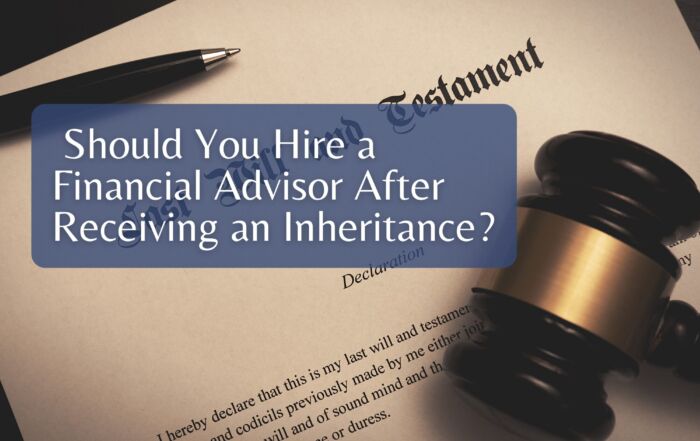
I’ve inherited $200k, what should I do?
Can inheriting money truly change your life for the better, or could it create unforeseen financial pitfalls? Inheriting money can be both a blessing and a burden. While exciting, the sudden influx of cash can also bring about a slew of decisions that need careful consideration. In this episode of A Wiser Retirement® Podcast, we dive into the best ways to utilize an inheritance wisely and discuss what to do if you inherit $200k.
Listen or Watch:
Summary
Inheriting money can be both a blessing and a burden. While exciting, the sudden influx of cash can also bring about a slew of decisions that need careful consideration. In this episode, we dive into the best ways to utilize an inheritance wisely.
Assess Your Financial Situation
First and foremost, it’s crucial to evaluate your current financial situation. Inheriting $200,000 can have different impacts depending on individual circumstances. For some, it might be a life-changing amount, while for others, it may serve as a financial cushion. Begin by assessing your overall financial health and identify any areas that need attention.
Pay Off Debts
One of the primary recommendations is to use the inheritance to pay off existing debts. This includes mortgages, credit card debts, student loans, and other liabilities. Clearing these debts reduces financial stress and frees up cash flow for other uses. It’s also important to change spending habits to avoid accumulating debt again in the future.
Build an Emergency Fund
Another wise use of an inheritance is to establish or bolster an emergency fund. Having three to six months’ worth of living expenses saved can provide a financial safety net for unforeseen circumstances, such as job loss or medical emergencies.
Invest in Education
Education is a powerful tool for elevating the next generation. Use part of your inheritance to pay off existing education debts or to fund future educational endeavors. Investing in education can create lasting benefits and opportunities for both you and your loved ones.
Consider Tax Implications
There could be tax consequences associated with various inherited assets. For example, inheriting cash or a brokerage account typically does not incur an inheritance tax. Stocks within a brokerage account receive a step-up in basis, meaning you won’t owe taxes on the appreciated value. Consult a financial advisor or CPA to understand the specific tax implications of your inheritance.
Set Financial Goals
Before making any major decisions, it’s important to set clear financial goals. Whether it’s accelerating existing plans like paying for education or legacy planning, having defined objectives can guide your decision-making process.
Avoid Hasty Decisions
Avoid rushing into actions like selling property or co-mingling funds in joint accounts, as these can lead to complications in case of marital discord or divorce. Keeping the inheritance in an individual account and setting up a transfer on death to the next generation as separate property is recommended.
Seek Professional Advice
Throughout the discussion, they underscore the importance of consulting a financial advisor. Personalized advice can help tailor decisions to your unique situation, removing emotional bias and ensuring a strategic approach to managing your inheritance.
Links:
- Access Our Free Guides: Gain valuable insights on topics such as why most financial plans fail, how to leave a financial legacy, post-divorce financial planning, and more!
Connect:
- Click here to schedule a consultation with one of our financial advisors.
- Follow us on social media: Twitter, Instagram, Facebook, LinkedIn, and YouTube.
- Learn more about A Wiser Retirement® podcast and access previous episodes.
Share This Story, Choose Your Platform!
Wiser Wealth Management, Inc (“Wiser Wealth”) is a registered investment adviser with the U.S. Securities and Exchange Commission (SEC). As a registered investment adviser, Wiser Wealth and its employees are subject to various rules, filings, and requirements. You can visit the SEC’s website here to obtain further information on our firm or investment adviser’s registration.
Wiser Wealth’s website provides general information regarding our business along with access to additional investment related information, various financial calculators, and external / third party links. Material presented on this website is believed to be from reliable sources and is meant for informational purposes only. Wiser Wealth does not endorse or accept responsibility for the content of any third-party website and is not affiliated with any third-party website or social media page. Wiser Wealth does not expressly or implicitly adopt or endorse any of the expressions, opinions or content posted by third party websites or on social media pages. While Wiser Wealth uses reasonable efforts to obtain information from sources it believes to be reliable, we make no representation that the information or opinions contained in our publications are accurate, reliable, or complete.
To the extent that you utilize any financial calculators or links in our website, you acknowledge and understand that the information provided to you should not be construed as personal investment advice from Wiser Wealth or any of its investment professionals. Advice provided by Wiser Wealth is given only within the context of our contractual agreement with the client. Wiser Wealth does not offer legal, accounting or tax advice. Consult your own attorney, accountant, and other professionals for these services.





